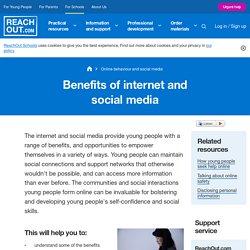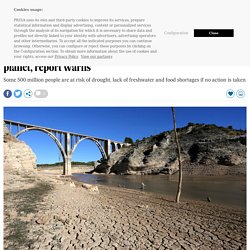

4 travel trends that are setting Generation Z apart. Gen Z’s relationship with tech: They don’t want to be always reachable. Each generation is more connected than the last, but the latest generation, those born after 1998, wants to buck the trend.

Members of so-called Generation Z are less likely than their millennial counterparts (66 percent versus 71 percent for women, and 57 percent versus 74 percent for men) to want to be “always reachable,” according to a new survey of 1,500 US residents by market research firm GfK Consumer Life. Volunteering in Spain: The Spanish health workers who make wishes come true. Paca, 82, was able to see her home town in Cáceres, in Spain’s western Extremadura region, for one last time before dying.

The parents of Hugo, an 11-month-old baby with chronic illness, were granted their wish for him to see the sea. Fabri, a terminally sick boy who wanted to return to his home country of Ecuador and die surrounded by his family, was able to overcome the logistical challenges involved with being transferred while hooked up to machines and medication. I am very happy, very. Migrant workforce in Spain: Why migrant workers are wanted in Spain’s most depopulated area. The cured meats factory La Hoguera has been looking for skilled workers for two years.

The cardboard manufacturing business Cartonajes Izquierdo cannot find anyone to fill a maintenance position or an IT role. And the logistics group Molinero is hoping to hire 150 truck drivers and forklift drivers, as well as administrative assistants and people who speak several languages. The northern province of Soria is the most depopulated area in Spain, and one of the most deserted places in the whole of Europe. Businesses there desperately need workers, but cannot find them. The owners of these companies would like to attract more foreigners, but the legal paperwork makes hiring them difficult. Teenagers and social networking – it might actually be good for them. The Big Myth About Teenage Anxiety. We hear a lot these days that modern digital technology is rewiring the brains of our teenagers, making them anxious, worried and unable to focus.

Don’t panic; things are really not this dire. Despite news reports to the contrary, there is little evidence of an epidemic of anxiety disorders in teenagers. This is for the simple reason that the last comprehensive and representative survey of psychiatric disorders among American youth was conducted more than a decade ago, according to Kathleen Ries Merikangas, chief of the Genetic Epidemiology Research Branch at the National Institute of Mental Health. There are a few surveys reporting increased anxiety in adolescents, but these are based on self-reported measures — from kids or their parents — which tend to overestimate the rates of disorders because they detect mild symptoms, not clinically significant syndromes. So what’s behind the idea that teenagers are increasingly worried and nervous? No surprise there. Benefits of internet and social media. The internet and social media provide young people with a range of benefits, and opportunities to empower themselves in a variety of ways.

Young people can maintain social connections and support networks that otherwise wouldn't be possible, and can access more information than ever before. The communities and social interactions young people form online can be invaluable for bolstering and developing young people's self-confidence and social skills. The use of social media and networking services such as Facebook, Twitter, Instagram and Snapchat have become an integral part of Australians’ daily lives. In collaboration with young people, we’ve documented some of the positive benefits of internet and social media for young people.
Young people as social participants and active citizens Social networking services can provide an accessible and powerful toolkit for highlighting and acting on issues and causes that affect and interest young people. 'For me, this is paradise': life in the Spanish city that banned cars. How Does Technology Affect Teens? – NHSPress. How often do you find yourself using technology?

It is very rare nowadays not to see teenagers using technology. According to the article “Technology’s Negative Impact On Teens,” “Everyday an average teenager spends up to 8 hours on electronic devices, which is more than 56 hours in one week.” Global warming: Mediterranean is warming up faster than the rest of the planet, report warns. Whether they like it or not, 500 million people from three continents are united by the same problem: climate change.

The Mediterranean basin is one of the hot spots of this global crisis, and in some ways it is being “hit harder than other parts of the world,” according to Wolfgang Cramer, scientific director at the French-based Mediterranean Institute of Biodiversity and Ecology (IMBE). Never before had there been such as complete synthesis as this Wolfgang Cramer, project coordinator A new report, whose main conclusions are being presented on Thursday in Barcelona, shows that the temperature increase in the Mediterranean region has already reached 1.5ºC above pre-industrial levels, which means that the warming effect in this area is 20% faster than the global average.
And what’s coming next, if additional measures to reduce greenhouse gases are not taken, is much worse: by 2040 the temperature increase will be 2.2ºC, and possibly as much as 3.8ºC in some parts of the basin by 2100.